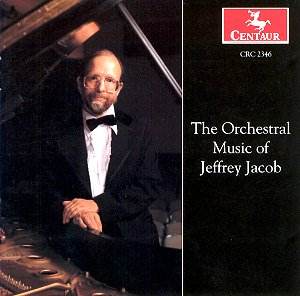Jeffrey Jacob may be
better-known as a brilliant pianist
and a dedicated, untiring champion of
contemporary piano music. He was one
of the pianists playing Francis Routh’s
piano music on REDCLIFFE RR 018 reviewed
here some time ago. He is also a
composer of no mean achievement as the
works recorded here clearly demonstrate.
These works date from the last fifteen
years or so, though we are not told
when At the Still Point
has been composed. We are told, however,
that this piece was originally written
as the first movement of Jacob’s second
piano concerto and that the composer
decided to let it stand as a separate
composition. (The title, you guess it,
is taken from Eliot’s Four Quartets.)
This short, predominantly dreamy piece
does stand on its own quite well indeed.
The music, economically scored for medium-sized
forces, is quite engaging and has a
somewhat nostalgic ring. The scoring
displays many fine orchestral and instrumental
touches that we come to regard as Jacob
hallmarks, with – for example – a liking
for tingling sonorities and a generous
use of chimes. Another characteristic
in this and the other pieces is the
presence of the piano, which often plays
a concertante role here as well as in
the Second Symphony and De Profundis.
The Symphony
No.2 was written for the Orquesta
of Baja California and their director
Eduardo Garcia Barrios who conducted
the first performance in 1996. It is
in three movements of which the first
one Allegro maestoso, roughly
in sonata form, is the most developed.
It opens in an arresting way with some
considerable energy. The slower, chamber-like
section (almost a piano trio) follows.
The whole is recapitulated with variations.
The slow movement is mostly song-like
and includes a tune inspired, so says
the composer, by the song The Beauty
and the Beast by Alan Mencken for
the Disney film... The third movement
caps this concise work with an energetic
Finale ending with a brilliant fanfare.
According to the composer,
De Profundis for piano
and strings was written at a time of
extreme personal crisis. Which may not
be quite evident, when listening to
it. He nevertheless goes on saying that
"[I] wanted to express a ‘cry out
of the depths’, but with a quiet restraint
and dignity". In this respect,
he has been quite successful. The music
is quite similar to that of At
the Still Point, with much busy
piano writing (too much so for some
tastes, I am afraid).
Finally, the Piano
Concerto No.1, completed in
1991 and first performed the following
year in St. Petersburg, is also in three
movements : a sonata form Allegro
energico, a song-like slow movement
and a Rondo-like final movement. This
was, it seems, Jacob’s first orchestral
work. If so, it may be said that he
had a clear view of what he wanted to
achieve, for this colourful and well-made
work obviously breathes the same air
and displays some considerable orchestral
mastery as the other later pieces in
this disc.
Jeffrey Jacob’s music
is quite attractive, colourful, tuneful,
with many fine instrumental touches.
Fairly straightforward, honest music
making by all counts. The recordings,
presumably of live performances, are
all quite satisfying. Well worth investigating.
Hubert Culot
